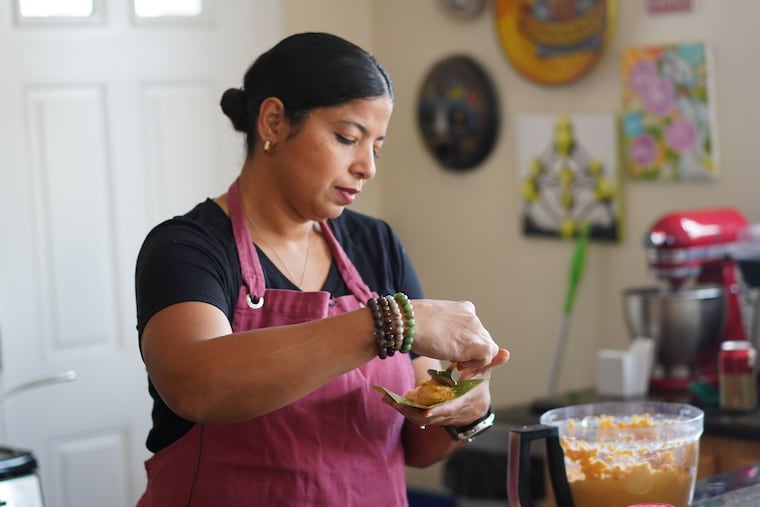After a call to boycott Goya, Philly Latino home cooks lean into traditional recipes
In Goya’s departure from our pantries, Latinx home cooks are using the moment to to learn traditonal recipes and to source similar ingredients from Asian, Puerto Rican, or Mexican supermarkets.

If 2020 has taught us anything, it’s that we must save ourselves. This year has been an exercise in facing ongoing ethical dilemmas, with every decision of what to buy and support adding another layer of exasperation. Newsletters from food writers and recipe developers arrive in my inbox each week with lessons in anti-racist, anti-capitalist cooking. But the demand for conscious consumption and reminders that our entire food system is political have driven me to mental burnout.
Now, a household food brand I grew up with embracing the white supremacy of the Trump administration is just the latest call to arms.
I’m not alone. As I watched the #boycottGoya drama unfold across my social media feeds, I witnessed my Latinx friends and peers quickly rally together to denounce the mass-producer of premade canned beans and seasonings — from calling out Goya’s role in contributing to the pandemic’s catastrophic toll on our marginalized people and insulting its inauthentic, unhealthy ingredients to curating higher-quality alternatives for traditional fresh, homemade adobos and sazons.
In Goya’s departure from our pantries, indie chefs and producers, like family-owned Loisa seasonings and Addo Seattle’s Eric Rivera’s meal kits, have been ready to take the reins.
I watched Puerto Rican food and travel writer Jessica van Dop DeJesus grocery shopping on Instagram Live showing her favorite non-Goya go-to staples, such as Badia spices, Iberia dried beans, and guava paste. Van Dop DeJesus is one of the many former Goya consumers who used the #boycottGoya moment to ramp up at-home cooking, sourcing similar ingredients from Asian, Puerto Rican, or Mexican supermarkets, calling her mom for pro tips, and seeking out more plant-based recipes like crema de yautia: a creamy soup seasoned with homemade sofrito topped with fresh avocado.
On Twitter, Carol Cain, an AfroLatina who grew up in Puerto Rico and the Dominican Republic and later the New York City area, spoke to the importance of preserving tradition, talking with and learning from loved ones, especially elders.
Unlike van Dop DeJesus and me, Goya was not a part of her home-cooking experience but taps into food memories from her abuela and mother. Cain has raised her three sons to pass on the heritage cooking they’ve come to love, bringing them to stores, showing them how to identify ingredients that make up the main base for her family’s food.
“There is something really beautiful in smelling, touching, and learning about the individual elements that create the flavors that are so identifiable in our cultural cuisine,” says Cain.
With many experiencing food apartheid during this pandemic, Goya products may have been the easier option. But accessing organic products from farmers and neighboring markets is instrumental for keeping people fed and educated. The Dining Traveler Guide to Puerto Rico authored by van Dop DeJesus is just one example that reveals the diversity within one food culture across the Latinx diaspora through the eyes of local growers, artisans, and cooks.
» READ MORE: After Goya Foods’ CEO praises Trump, Philly Latinos boycott and turn to other brands
The staff at South Philly’s Café Ynez agree, and are committed to its made-from-scratch menu, and supporting their neighbors.
“[We] strongly believe that we can survive without Goya. … We realize now, as Latinos, how we can really help our neighbors & farmers,” read a statement from the Mexican restaurant.
Throughout the pandemic, the Café Ynez team has been brainstorming dishes that can be easily repurposed for at-home meals: three-bean salad with fresh corn, pinto beans, chickpeas, and black beans and chicken tinga. Some have even been distributed to frontline workers.
While some people are just discovering the seasoning and rushing to buy Goya cans from large chain grocery stores, I’ve been doubling down on frequenting my South Philly Hispanic grocery stores La Tienda and South Philly Mini Market on Snyder Avenue to backfill my now Goya-less house. A summer menu emerged: pinchos de pollo marinated in sofrito or topped with guava barbecue sauce inspired by Von Diaz’s Coconuts & Collards, bacalaitos with diced peppers and fresh corn like my mom used to make, empanadas stuffed with rice and ground beef, garlic-heavy pernil to be turned into pulled pork.
Later on the phone catching up with my mom, I asked her if she still uses Goya as a meal time-saver.
“Hell no.”
In the end I thank Goya’s CEO for showing us we don’t matter. We don’t need Goya to feed us; we can nourish ourselves.